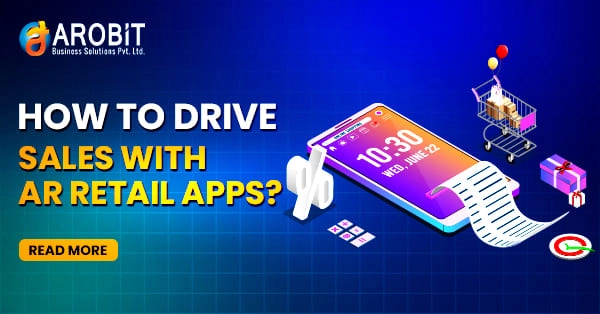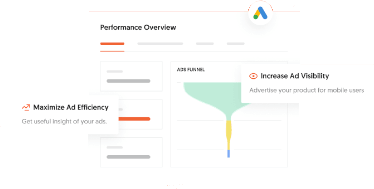In the consistently digitizing arena, retailers are consistently seeking innovative technologies to capture the attention and wallets of tech-savvy consumers. Augmented Reality (AR) is one such technology that's transforming the retail industry, providing both an immersive experience and a novel way for customers to engage with products.
It adds a digital layer to the physical world, allowing consumers to visualize products in their own environment, which greatly enhances the buying experience.
This technology is particularly potent in the form of AR retail apps, which are having a significant impact on customer engagement and sales.
These apps offer an interactive platform that not only entertains customers but also gives them a better understanding of the product’s features and suitability for their specific needs.
Retailers who are adept at leveraging AR app development can transform the shopping experience, making it more convenient, personal, and memorable. With a well-strategized AR app, the bridge between online and offline shopping can be seamlessly connected, leading to a significant drive in sales and customer loyalty.
Augmented Reality in Retail
Augmented Reality (AR) retail apps merge the physical and digital realms, offering consumers an immersive shopping experience through their mobile devices. By overlaying digital information onto the real world, these apps allow users to visualize products in their intended environment before making a purchase.
For example, customers can see how furniture fits in their living room, how a pair of glasses looks on their face, or how a new color of paint would change their bedroom, all through the screen of their smartphones or tablets.
This innovative approach to shopping bridges the gap between the convenience of online shopping and the desire to 'try before you buy,' ultimately aiding in purchasing decisions and enhancing customer satisfaction.
As a result, AR retail apps are rapidly becoming an essential feature in the digital strategy of forward-looking retailers.
Immersive Product Visualizations
One of the most striking features of AR apps in retail is the ability to create immersive product visualizations. Customers can virtually place products into their real-life environment and interact with them, which used to be a possibility only in physical stores.
For example, furniture retailers have already embraced this feature allowing customers to see how a new couch or table would fit and look in their living room before buying it.
This level of interactivity significantly reduces the gap between customer expectations and reality, thereby decreasing the likelihood of returns and exchanges. Immersive visualizations not only boost customer confidence in their purchasing decisions but also significantly enhance customer engagement.
Most importantly, enhanced engagement leads to increased time spent on the retailer’s platform, which has a direct positive impact on sales conversions.
Interactive Product Catalogs and In-Store Navigation
AR provides a robust platform for retailers to transform their traditional product catalogs into interactive shopping experiences. Through AR retail apps, customers can scan products to reveal in-depth information, view 3D models, or even see products in action, all on their smartphone screens.
This interactive element can lead to an enriched product understanding and stronger brand connection, driving sales in the process.
Moreover, AR can optimize the in-store experience by guiding customers to their desired products with AR-induced navigational prompts. When customers can navigate stores effortlessly, their shopping experience improves, leading to a happier visit and the potential for increased purchases.
Plus, these apps can offer personalized recommendations based on customer preferences and prior shopping behavior, further boosting sales through tailored experiences.
Virtual Try-Ons and Customization
AR retail apps can offer virtual try-on features, allowing customers to see how clothes, accessories, glasses, or makeup items would look on them without physically trying them out. This not only saves time but also considerably improves the online shopping experience by reducing uncertainty.
Moreover, shoppers enjoy the convenience of exploring multiple options quickly which can lead to impulse buys, uplifting sales.
Customization is another area where AR brings value to the table. Imagine the ability for a customer to customize products to their liking, changing colors, materials, or components – all through an AR interface.
This level of personalization can be the deciding factor in the purchase process as it enhances the emotional connection with the product, leading to increased customer satisfaction and sales.
Enhanced Social Sharing and Marketing
The social sharing capabilities inherent in AR retail apps provide a golden opportunity for organic marketing. When customers share their Augmented Reality experiences with products on social media, they are inadvertently endorsing and advertising them to potential new customers.
This word-of-mouth marketing is not only cost-effective but also incredibly influential, as recommendations from friends and family carry significant weight.
Retailers can capitalize on AR for promotional campaigns as well. For instance, interactive AR advertisements can capture attention far more effectively than static images, potentially leading to higher engagement and conversion rates.
Integrating social connectivity and marketing into AR apps can allow retailers to foster a community of loyal customers and brand ambassadors, all while driving up sales.
Real-Time Analytics and Feedback
Incorporating AR into retail apps allows businesses to collect real-time analytics and feedback from user interactions. Real-time analytics enable retailers to understand how customers engage with their products in an AR setting, which products attract more attention, and which features prompt interaction.
Retailers can then use this valuable data to make informed decisions about product placements, marketing strategies, and inventory management.
Furthermore, in-app feedback mechanisms can provide immediate insights into the user experience and product reception. This will prompt quick iteration and improvement of both the AR app itself and the products featured within it, optimizing the customer experience and driving sales by catering to consumer preferences more effectively.
Enhanced Customer Education and Service
AR app development can serve as an educational tool that informs customers about product usage, features, and benefits. By providing a virtual demo of a product, customers can see how to use or assemble an item before purchasing it, effectively reducing doubts and encouraging confident buying decisions.
Video tutorials, AR instructions, and interactive manuals can enhance customer education, thereby promoting a more informed, satisfied customer base.
Additionally, Augmented Reality can revolutionize customer service by offering visual assistance for queries and support issues. Through augmented reality interfaces, customer service representatives can guide customers in solving problems in real-time, offering a more personal touch than traditional online or phone support.
By streamlining the post-purchase experience with AR, retailers can improve customer satisfaction, encourage repeat business, and cultivate brand loyalty, which in turn drives sales.
Location-Based Marketing and Personalization
Leveraging geolocation data, AR retail apps can offer personalized experiences based on the user's location. Retailers can push location-specific content, such as special offers, events, or in-store promotions, directly to the user's device. For example, when a customer passes by a store, they could receive a notification inviting them to an AR-enhanced in-store experience or provide exclusive deals.
Through location-based marketing and AR, retailers can not only attract more foot traffic but also create a highly personalized shopping experience that resonates with the consumer's context and preferences at any given time.
This level of personalization can be instrumental in boosting in-store engagement, fostering brand loyalty, and driving sales both online and offline.
Grasp the Most Out of AR With Us!
AR technology, especially in the form of AR app development presents an opportunity that forward-thinking retailers cannot afford to ignore. As more consumers demand interactive and personalized shopping journeys, AR apps stand as a beacon for the future of retail.
Retailers who are early adopters of this technology will find themselves at the forefront of an industry-wide transformation. They will not only set themselves apart from the competition but also build a strong, modern brand image that resonates with the digital consumer of today.
If you want to develop a cutting AR retail app and bring your vision to life, partnering with Arobit is the way to go. We combine our years of experience with cutting-edge and advanced technologies to craft a solution that perfectly upholds your business needs.







